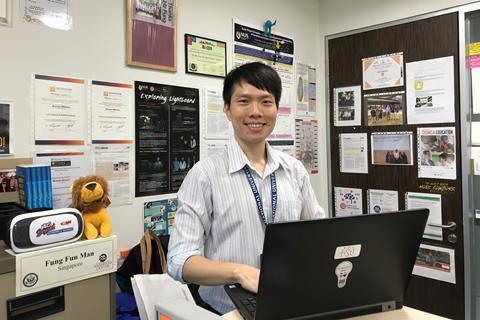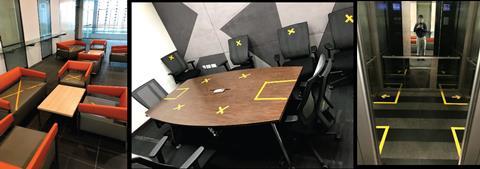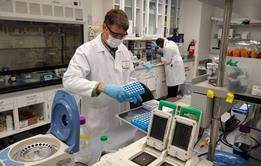An education technology guru in Singapore finds himself inundated with requests for advice and invitations to speak since the pandemic hit
During this difficult time, Chemistry World is checking in with chemists around the globe to see how they are weathering the Covid-19 pandemic.

Fung Fun Man, an instructor at the National University of Singapore (NUS) whose work centres mostly on chemistry education, was ready when the Covid-19 pandemic hit his country earlier this year. The group that he leads in NUS’ chemistry department focuses on using technologies like videography and even virtual reality (VR) to teach chemistry.
He has taught hybrid classes since 2012, which deliver 50% of the course in-person and the other half online. Under this model, Fung teaches the lab components of his classes live in teaching laboratories, while the fundamentals and theory – including lab safety – are taught online.
The Sars virus, which hit places like Singapore and China really hard in 2003 when Fung was a teenager, made a big impression. ‘I had in mind that one day we just might need these kind of tools,’ he recalls.
Fung uses VR and so-called ‘immersive’ technologies in these blended courses, making use of equipment like smartphones, GoPro cameras that offer a first-person point of view, so-called 360 cameras that capture large visual fields, as well as Youtube videos and other multimedia platforms.
Much needed expertise
Those in his courses sometimes wear 3D VR goggles. In fact, Fung has been awarded educational grants whereby he buys such eye gear for €5 (£4.56) each and loans them out to his students. Smartphones are a prerequisite for these hybrid classes, and Fung has spares to lend to students who need one.
After spending years researching the most effective and high-tech methods for teaching chemistry, often remotely, Fung was gratified to find that his expertise suddenly became highly sought after when the pandemic caused universities everywhere to switch to online instruction. Chemists and educators everywhere reached out to him.
He appreciated the attention, following all the years when people accused him of being too futuristic. ‘I felt vindicated when a rush of requests came to me when Singapore institutions learned that they have to move to home-based learning,’ he says. ‘People sought advice on the technological tools they could use, and strategies to plan engaging classes using multimedia.’
The teaching equipment he has recommended include not only VR and 360 cameras, but also devices like the Lightboard that allows instructors to write their notes while facing students, drones that can help create next-level educational videos, as well as social media applications like Instagram to which short videos can be posted that can capture the attention of students. As an example of how these tools are useful in teaching, Fung’s team has developed an application using augmented reality to visualise biomolecules and complex structures in 3D.
In the past few months, Fung has been invited to deliver many online talks, primarily addressing how to support student learning with engaging online classrooms. He has participated, for example, in an IUPAC ‘Chemists Fighting Covid-19’ webinar, as well as online seminars and symposia of the Singapore National Institute of Chemistry, the International Younger Chemist’s Network, and other international scientific organisations.
Back but not at full capacity
For all this volunteer community work, the Young Southeast Asian Leaders Initiative recently honoured him as a ‘Hero’ for his efforts to address Covid-19. These opportunities to connect with others and advise them has helped Fung during this time when he has really missed travelling and social interaction.
Due to the pandemic, he and colleagues were locked down at their homes from early April until 1 June. Now, he and colleagues are able to go back to NUS two or three times a week at specific assigned times. Lab work has also resumed in shifts.

Researchers in the university’s labs are divided into morning and afternoon shifts that never interact. In addition, people must wear masks and stay about 1–1.5m apart in the lab, so research has not yet returned to full capacity. ‘The efficacy of lab research has dwindled a lot,’ Fung says. ‘I don’t think it’s even half.’ Only about half the members of one team can be in the lab at any given time because of those physical distancing requirements, and the rest typically analyse data in separate spaces.
Those on campus must also take their temperature twice a day with an NUS-issued thermometer, and then record the results with their cell phone cameras. That information must then be uploaded to a central repository.
Masks are also mandatory in Singapore outside of one’s house, and police can issue a S$300 fine for failure to comply, Fung says. A second offence triggers a fine of more than three times that amount, he adds. Faculty members don’t have to wear masks while alone in their own offices, but researchers working with others in a lab must do so.
Fung is adamant that professors and researchers everywhere should assume that online teaching and learning is the new normal. ‘I suspect that there is a huge group of lecturers who think that they can just make do with minimum technology, and just go online and teach to get by until next semester,’ he says. ‘Now is the time find your moral courage to embrace technology and actively learn to support university students during hybrid teaching.’
Chemists amid coronavirus

How chemists around the world are coping with life and work during the Covid-19 pandemic
- 1
- 2
- 3
- 4
- 5
- 6
- 7
- 8
- 9
- 10
- 11
- 12
- 13
- 14
- 15
- 16
- 17
- 18
- 19
- 20
- 21
- 22
- 23
- 24
- 25
- 26
- 27
- 28
- 29
- 30
 Currently
reading
Currently
reading
Chemists amid coronavirus: Fung Fun Man
- 32
- 33
- 34
- 35
- 36
- 37
- 38
- 39
- 40



























































































No comments yet